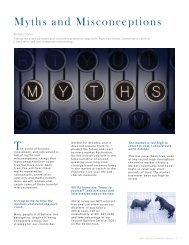Spring 2022 Newsletter
In this Spring 2022 Newsletter, learn some valueable information to help navigate through an era of inflation and other market worries.
In this Spring 2022 Newsletter, learn some valueable information to help navigate through an era of inflation and other market worries.
Create successful ePaper yourself
Turn your PDF publications into a flip-book with our unique Google optimized e-Paper software.
Strategic Planning Group 1
C O N T E N T S<br />
Ryan Craner<br />
shares some<br />
great strategies<br />
to consider. pg. 3 - 5<br />
pg. 3<br />
Lions, Tigers, Bears, Oh My!<br />
Inflation, The Fed, Recession, Oh My!<br />
by Ryan Craner<br />
Ryan shares some important insights and<br />
reminders regarding the market concerns.<br />
pg. 6<br />
Be Greedy When Others Are Fearful<br />
by John Park<br />
John recommends some helpful strategies<br />
as fear of events encompasses us.<br />
pg. 8<br />
In Hindsight:<br />
Let History Be Your Guide<br />
by Tom Craner<br />
Tom takes us through a decade of events as<br />
we try to navigate towards long-term goals.<br />
pg. 10<br />
Are We Recklessly Optimistic?<br />
by Alex Craner<br />
Alex helps us recognize that downturns are<br />
a part of the volatility an investor must bear<br />
to earn stock market returns.<br />
pg. 13<br />
Banana Bread Recipe<br />
by Heather Cunningham<br />
Enjoy one of Heather's favorite recipes.<br />
pg. 3<br />
Lions, Tigers, Bears, Oh My!<br />
Inflation, The Fed, Recession, Oh My!<br />
pg. 14<br />
Meet the Team<br />
Introducing the new members of the office.<br />
Strategic Planning Group 2
Lions, Tigers, Bears, Oh My!<br />
Inflation, The Fed, Recession, Oh My!<br />
By Ryan Craner<br />
Taking the client advocate and consumer protection approach, Ryan has always viewed every<br />
client as a long-term and very important relationship.<br />
The fearmongers in the media<br />
are out in numbers and they<br />
want you to be afraid, very afraid!<br />
I will remind you that much<br />
of the fear being promoted<br />
is overstated. Just like the<br />
Lion’s, Tiger’s, and Bear’s<br />
fearful chant from the Wizard<br />
of Oz was overstated as well.<br />
Remember that Dorothy and<br />
company only saw a Cowardly<br />
Lion, no Tigers, or Bears!<br />
Recently, we have seen numerous<br />
reports that at first blush are<br />
worrisome and concerning<br />
regarding the economy and the<br />
markets. Of course, and as usual,<br />
the “chicken little” financial<br />
media and traditional media<br />
report these events in the darkest<br />
terms possible. Dramatizing and<br />
fearmongering the events that<br />
we knew already existed or we<br />
already knew they were coming.<br />
In the last several weeks we<br />
have heard that the economy<br />
measured by GDP had slowed<br />
in the first quarter of <strong>2022</strong>.<br />
We also saw the inflation rate<br />
increase to 8.5%. Also expected.<br />
The first week of May we saw the<br />
Fed raising interest rates by .5%<br />
(as expected and announced).<br />
The media runs to the<br />
microphones and reports these<br />
facts as if it were a total shock to<br />
everyone! Well, no, the markets<br />
have had these events already<br />
factored in. We knew rates were<br />
going up. The Fed chairman<br />
and the board members have<br />
been announcing and telling<br />
us this for months. Inflation has<br />
been on the rise and predicted<br />
to be higher for months.<br />
The fearmongers<br />
in the media are<br />
out in numbers and<br />
they want you to be<br />
afraid, very afraid!<br />
Strategic Planning Group 3
It will very likely go higher still<br />
before it comes back down to<br />
tolerable levels. We know that<br />
based on history. Although,<br />
it has been 40 years since we<br />
last saw inflation like this, 1979<br />
through 1982. Somehow that is<br />
a reason to be more afraid and<br />
overreact to inflation because<br />
“this is the highest inflation rate<br />
we have seen in over 40 years!!!”<br />
Well, actually, that is normal!<br />
Would you care to guess when<br />
the inflation rate increased<br />
dramatically before the 1979-82<br />
high inflation period? Yep, you<br />
guessed it. It was 35-40 years<br />
before that in the mid-1940s,<br />
and before that? Yep, you’re<br />
right again, 35 years before that<br />
Recessions are<br />
normal and common<br />
place in long-term<br />
economic history.<br />
in the early 1900’s. So every<br />
35-40 years the economy goes<br />
through an inflationary period,<br />
historically for only 3 years or<br />
so, and yes, we can expect more<br />
inflation in the coming year or<br />
two and more interest rate<br />
increases from the Fed. These will<br />
not be surprises or unexpected.<br />
Also, something that is important<br />
to note, is that following these<br />
periods of high inflation, we<br />
have seen massive big bull<br />
market green zones. For example,<br />
following the early 1900’s inflation,<br />
we saw the roaring 20’s. After<br />
the mid-1940’s inflation, we<br />
saw the huge green zone of<br />
the 50’s and 60’s and following<br />
the inflationary period of ’79-<br />
’81, we saw the go-go green<br />
zone of the 80’s and 90’s.<br />
The seeds of market recovery<br />
are being planted this week.<br />
Another important factor to<br />
consider is that we have 73<br />
million millennials in the U.S.<br />
alone who are practically<br />
forced into buying stocks<br />
for the next several decades.<br />
Watching the market over the<br />
last year or so, we are seeing<br />
the typical patterns, and we<br />
are seeing the typical investor<br />
behavior. The markets are, as<br />
usual, assuming and factoring<br />
in inflation, rate increases, and<br />
yes, even a recession. Very<br />
important to remember on<br />
recession! Recessions are normal<br />
and common place in long-term<br />
economic history. Recessions are<br />
usually small and short lived. I see<br />
people assume that when they<br />
hear the word recession, that it<br />
means we are looking at 2008<br />
again! This is not historically true.<br />
Most recessions are small and<br />
short lived, and again, common<br />
place through years, even during<br />
green zones like the 80’s and<br />
the 90’s and the 50’s and 60’s.<br />
Don’t overreact to recession talk.<br />
Expansions<br />
and<br />
contractions<br />
are<br />
Normal!<br />
Historically, low<br />
points have never<br />
lasted long. V<br />
Shaped market<br />
recoveries are<br />
most common.<br />
Long-term discipline<br />
and behavior has<br />
always worked best.<br />
This means calm,<br />
rational, thoughtful<br />
behavior is the best<br />
course.<br />
REMINDERS<br />
Strategic Planning Group 4
Now, I mentioned investor<br />
behavior. Bad and inaccurate,<br />
predictable investor behavior<br />
is occurring as well. We see<br />
people, in general, tempted to<br />
sell low, and worse, suspend<br />
or delay new investments or<br />
buy ins to their investment and<br />
retirement accounts until the<br />
market is higher. Most all of<br />
our clients are wiser than that.<br />
However, sometimes you just<br />
need to be reassured. This article<br />
is part of that reassurance,<br />
and, of course, if you wish to<br />
talk further, myself and each<br />
of the advisors at Strategic<br />
Planning Group are available<br />
and more than happy to talk<br />
with you. That is part of our job.<br />
It should be noted that many<br />
of the economists and market<br />
analysts that we follow are<br />
still predicting a better end to<br />
<strong>2022</strong> than the first half of <strong>2022</strong>.<br />
There are still many positive<br />
economic catalysts in front of<br />
us, namely the lack of severe<br />
COVID policy and shutdowns,<br />
the low likelihood of any new tax<br />
increases, and the continued,<br />
very large, influx and importing<br />
of capital coming into the U.S.<br />
each year as a result of the Tax<br />
Cuts and Jobs act of 2017 (TTJA).<br />
Reminders About<br />
Investment Markets<br />
and the Economy:<br />
1. Expansions and contractions<br />
are normal!<br />
2. Historically, low points have<br />
never lasted long. V shaped<br />
market recoveries are most<br />
common.<br />
3. Long-term discipline and<br />
behavior has always worked<br />
best. This means calm, rational,<br />
thoughtful behavior is the best<br />
course.<br />
Things to Consider Now:<br />
If you have had money to invest<br />
but hesitated and watched markets<br />
go up substantially without you, this<br />
is a great time to buy. We believe that<br />
current conditions are presenting<br />
tremendous buying opportunities<br />
and tax opportunities.<br />
Strategies to Consider:<br />
1. If you have an annual<br />
withdrawal coming up soon, it<br />
could be wise to delay that until<br />
later this year if possible.<br />
2. If you are taking income out<br />
that is really not necessary at<br />
this time, delay or suspend it for<br />
a short time.<br />
3. If you are planning to buy in<br />
or contribute money to your<br />
investments and retirement<br />
accounts this year, this would<br />
be a great week to do that.<br />
4. For those of you that have<br />
considered converting all or a<br />
portion of your traditional IRA<br />
or 401k to a Roth, this could be<br />
an excellent opportunity to do<br />
that at a substantial tax savings<br />
while markets are lower.<br />
5. If you have friends, family, or<br />
co-workers that you have talked<br />
to about coming to see us, and<br />
it just hasn’t happened yet,<br />
this week is a perfect time for<br />
them to call and get the process<br />
started. These opportunities<br />
may not last.<br />
In Conclusion<br />
So, once again, the message<br />
from me and your advisors at<br />
Strategic Planning Group is that:<br />
We are not afraid. We are not<br />
worried about the long-term<br />
results. We are invested, ourselves,<br />
in the very same portfolios that<br />
you hold. We are very confident<br />
that we will soon emerge from<br />
this period of uncertainty.<br />
A reminder to you all,<br />
limit your media and news<br />
intake, you will feel better.<br />
Also remember, live your life, enjoy<br />
your family, friends, and your<br />
favorite activities and hobbies.<br />
Life is good and these are<br />
the good years! Keep that<br />
attitude because it’s true!<br />
We are watching. We are hard at<br />
work managing your investments.<br />
History shows that we are<br />
positioned for long-term success!<br />
Sources:<br />
CPI Home : U.S. Bureau of Labor Statistics (bls.gov) – All Items (inflation)<br />
https://www.ftportfolios.com/Blogs/EconBlog/<strong>2022</strong>/5/4/jerome-volcker<br />
https://www.ftportfolios.com/Blogs/EconBlog/<strong>2022</strong>/4/28/real-gdp-declined-at-a-1.4percent-annual-rate-in-q1<br />
https://www.benzinga.com/trading-ideas/21/03/20195933/cnbc-contributor-josh-brown-says-millennials-are-forced-investors-says-theres-no-reason-theydwant-<br />
Strategic Planning Group 5
Be Greedy When Others<br />
Are Fearful<br />
By John Park<br />
From investments to complicated retirement strategies, John works to educate and advice his<br />
clients on making smart financial decisions.<br />
Among many great quotable<br />
statements, one of my favorites<br />
from Warren Buffet is to be “fearful<br />
when others are greedy, and<br />
greedy when others are fearful.”<br />
The second part of that quote<br />
is what truly separates good<br />
investors from bad.<br />
When the markets are down and we<br />
face uncertainty in the economy,<br />
it’s easy to be fearful and pessimistic.<br />
Since it is so easy, being negative<br />
tends to come naturally.<br />
True optimism, on the other hand,<br />
requires you to act; assessing a<br />
situation, realizing all is not lost,<br />
and forging a path forward to<br />
prosperity.<br />
While we want to be positive and<br />
focus-forward, it is still important<br />
to be honest about current events.<br />
Let us talk about the negative<br />
for a moment, then we will<br />
talk about an action plan and<br />
positive strategy.<br />
When I wrote my last newsletter<br />
article, I quoted inflation as being<br />
5.4%. It is now 8.54%. Supply<br />
chain shortages continue to strain<br />
our economy. Russia invaded<br />
Ukraine. The S&P 500 is -11.48%<br />
YTD. The NASDAQ is down<br />
-19.26% YTD. COVID version “X”<br />
is cropping up. Need I go on?<br />
You get the picture. There is no<br />
shortage of negative news.<br />
Here is what I recommend<br />
going forward: 1) Be smart with<br />
your existing investments. 2)<br />
Take advantage of downside<br />
strategies.<br />
Be Smart with Your<br />
Existing Investments:<br />
Stocks, bonds, mutual funds,<br />
and exchange traded funds are<br />
assets. They are real, monetary<br />
instruments and assets. Do not<br />
be reckless with them. Simply<br />
put, do not sell them when they<br />
are down. I cannot emphasize<br />
that enough. It sounds so simple,<br />
but the best advice often is.<br />
Admittedly, simple does not always<br />
mean easy, and in most cases, is<br />
much harder to practice.<br />
Maybe a different perspective<br />
will help you not be tempted<br />
to dump important investment<br />
assets when they are down.<br />
When you hold a certain number<br />
of shares in an investment, the<br />
decrease of market value does<br />
not evaporate your shares. You<br />
still own the same number of<br />
those assets. Let’s say you own<br />
1,000 shares of Amazon<br />
(congratulations if you do) and<br />
the stock absolutely tanks.<br />
You will not be happy with the<br />
value of your investment, but<br />
you will still own 1,000 shares<br />
of Amazon. Why on earth would<br />
you dump it? You have witnessed<br />
firsthand what that stock can do.<br />
Do not panic and “sell while you<br />
still can.” Whether you are in<br />
a specific stock, or diversified<br />
portfolio spread across thousands<br />
of stocks (via funds), the concept<br />
is the same: you still own those<br />
specific shares.<br />
In my mind, selling stocks while<br />
they are down, is the same as<br />
selling your home because its<br />
value dropped. If your home<br />
value drops, are you going to<br />
sell your home, go rent a place,<br />
and buy again once prices go<br />
back up? Of course not! Yet,<br />
people try this all the time when<br />
the stock market is down.<br />
Some people incorrectly view<br />
the stock market as gambling. If<br />
it starts dropping, they think it<br />
is only a matter of time before<br />
they lose it all. Proper stock<br />
market investing is the literal,<br />
statistical, opposite of gambling.<br />
It is a fact when you gamble in<br />
Vegas, the longer you are in the<br />
casino, the more likely you will<br />
lose your money. This is because<br />
the house has the better odds<br />
and why, in a casino, everything<br />
is designed to keep you in your<br />
seat.<br />
In a properly diversified, longhold<br />
strategy market portfolio,<br />
the longer you invest, the more<br />
Strategic Planning Group 6
certain you are of a gain. For the<br />
record, I am not talking about<br />
a minimum of 20 or 30 years.<br />
The fact is, there are far more<br />
positive years in the markets<br />
than negative. For example,<br />
since the inception of the S&P<br />
500 Index in 1957, there have<br />
been 17 negative years in the<br />
market, 1 zero, and 47 positives.<br />
That is a positive to negative<br />
ratio of 2.76:1. In other words,<br />
for every negative year, there<br />
are almost three positive years!<br />
When you see the resilient and<br />
impressive nature of the stock<br />
market, it is easy to realize you<br />
should hold on to those assets<br />
and be greedy over them. Do<br />
not sell them to someone else<br />
for less than you paid.<br />
Take Advantage of<br />
Downside Strategies:<br />
Let’s talk about smart strategies<br />
you should be employing RIGHT<br />
NOW.<br />
BONDS<br />
As your advisory team, we<br />
automatically deploy certain<br />
strategies for you. One strategy<br />
that we use, we will have started<br />
years before clients even retire.<br />
If you are retired and utilizing<br />
your investments for income<br />
generation, we have kept you<br />
in a healthy amount of bonds<br />
or other fixed income assets to<br />
protect your income. The right<br />
kinds of bonds will help offset<br />
the volatility of stocks and, more<br />
importantly, give you a place<br />
to pull income from during<br />
negative stock periods. This is<br />
a perfect example of not selling<br />
stocks or stock funds while they<br />
are down.<br />
Starting in January this year,<br />
we changed our client’s income<br />
distributions to primarily pull<br />
from fixed income investments<br />
to do that until stocks recover.<br />
This is a crucial step to protect<br />
your stock market assets. That<br />
is our part. Your part is to avoid<br />
unnecessary large withdrawals<br />
or panic selling.<br />
In June of 2021, we felt the<br />
Fed was being too soft on<br />
inflation and not properly<br />
increasing interest rates. We<br />
figured procrastinating interest<br />
rate increases would mean<br />
they would have to get more<br />
aggressive later. Unfortunately,<br />
we were right. Fortunately, in June<br />
we started moving into short<br />
duration and other bond positions<br />
that are more defensive to<br />
inflation and rising rates.<br />
MARKET MOVEMENT<br />
Also, in January of this year, we<br />
moved a few aggressive stock<br />
funds into more conservative/<br />
defensive positions. Although<br />
none of these were drastic steps<br />
like selling into cash, they have<br />
and will likely continue to make a<br />
significant difference over time.<br />
More often than not, making<br />
huge swings in and out of the<br />
market is more detrimental<br />
than market drops. You are<br />
not psychic, so do not try to<br />
be with market movements.<br />
Simply riding through the<br />
storm, holding firm to strategies,<br />
and exercising diligence is the<br />
tougher but better approach. In<br />
short, we do not make drastic,<br />
bold moves in and out of the<br />
market; however, we do actively<br />
adjust our models within certain<br />
reason and strategy.<br />
BUY<br />
The next smart strategy to<br />
employ during this time is to<br />
BUY, BUY, BUY. Stocks are on sale<br />
right now. Be greedy and gobble<br />
them up. We always insist you<br />
keep proper cash reserves and<br />
emergency savings. Beyond<br />
that, if you have excessive liquid<br />
funds, now would be a smart<br />
time to buy. If you are preor<br />
IRA contributions. Better yet,<br />
increase your contributions. Be<br />
greedy.<br />
If you are retired, not contributing,<br />
or can’t afford to contribute<br />
any more, do not worry. Your<br />
investments are buying on the<br />
dips for you. What I mean by this<br />
is that you have many investment<br />
positions still paying dividends.<br />
Despite their stock prices<br />
being down, many companies<br />
are still profitable and paying<br />
shareholders dividends.<br />
Take a look at your monthly<br />
statements so far this year.<br />
You will see many line-item<br />
transactions for varying dollar<br />
amounts of dividends paying into<br />
your account. We typically have<br />
these dividends set to reinvest<br />
automatically. This means if “X”<br />
mutual fund pays you a $100<br />
dividend, it automatically buys<br />
for you $100 more of that same<br />
fund.<br />
This is what we call compounding<br />
dividends, and it is massively<br />
powerful. In this scenario, not<br />
only do you have the same<br />
number of shares before the<br />
dip began, but you also gain<br />
more if you reinvest dividends.<br />
This will act as a compounding<br />
growth factor as things recover.<br />
Congratulations, you were<br />
greedy and gained more shares<br />
while prices were down.<br />
STAY INVESTED<br />
I urge you to stay invested. Do<br />
not panic when things decline.<br />
Market dips are temporary, they<br />
always have been and always<br />
will be, perhaps until the world<br />
ends. Hopefully if that ever<br />
happens, you and I are onto<br />
bigger, better things! In all<br />
seriousness, in the markets and life,<br />
those who remain optimistic,<br />
stay diligent, and follow a plan<br />
tend to fare far better than those<br />
who are pessimistic and panic.<br />
Sources on page 8<br />
Strategic Planning Group 7
In Hindsight:<br />
Let History Be Your Guide<br />
By Tom Craner<br />
Tom engages in life-long client-advisor relationships, utilizing long-tested financial strategies<br />
that are focused on consumer protection.<br />
There has been recent tumult<br />
in the markets, and I am<br />
sure you have noticed. We are<br />
hearing reports of “runaway<br />
inflation” and “a 2008 style<br />
recession.” Nevermind the fact that<br />
predictions of these events are<br />
more common than dandelions<br />
in the springtime.<br />
Remember all the times and<br />
events that caused panic and<br />
fear? Let’s take this opportunity<br />
to go over the biggest stories of<br />
the past 10 years and see why<br />
we should be confident, despite<br />
the similar fearmongering<br />
headlines we see today. We can<br />
ask ourselves if our collectively<br />
short memory is causing us<br />
to relive the same negative<br />
emotional state regarding our<br />
investments that we have seen<br />
before.<br />
A DECADE IN REVIEW<br />
2011<br />
We hit the debt ceiling, saw<br />
“Occupy Wall Street” protests<br />
erupt, witnessed the Greek<br />
economy collapse, and for the<br />
first time in history the S&P<br />
downgraded U.S. debt.<br />
2012<br />
We approached what the<br />
fearmongers called the “Fiscal<br />
Cliff.”<br />
2013<br />
The IRS overreached and was<br />
proven to have engaged in audit<br />
malpractice, Detroit declared<br />
bankruptcy, and there was a<br />
federal government shutdown.<br />
2014<br />
We lived through the Ebola<br />
epidemic, saw fighting in<br />
Ukraine, and Russia’s annexation<br />
of Crimea despite world-wide<br />
condemnation, the Israel-Hamas<br />
conflict began, we saw the rise<br />
of ISIS, and a major migrant crisis<br />
consisting of unaccompanied<br />
minors took place on the<br />
southern border.<br />
2015<br />
The Greek economy was bailed<br />
out, and the IRS was hacked by a<br />
Russian crime syndicate.<br />
2016<br />
We saw Great Britain finally<br />
leave the EU (Brexit), and the Fed<br />
increased rates in the U.S.<br />
2017<br />
Despite the first major tax cuts<br />
passed in decades, the Fed<br />
increased rates even further.<br />
2018<br />
We witnessed an intra-year<br />
market correction of over 20%<br />
in December, we began a trade<br />
war with China, unemployment<br />
fell to a 49-year low, the Fed<br />
increased rates yet again, and<br />
we saw many headlines about a<br />
“global economic slowdown.”<br />
2019<br />
The yield curve inverted, the<br />
Fed lowered rates, the federal<br />
government shutdown again,<br />
and COVID-19 began spreading<br />
in China.<br />
2020<br />
The people in Hong Kong<br />
protested for their independence,<br />
and unfortunately lost, while<br />
COVID-19 became pandemic,<br />
followed by a 34% market<br />
correction in March and April,<br />
Black Lives Matter rioted in cities<br />
throughtout the summer<br />
resulting in billions in damages<br />
and dozens dead, a record<br />
earthquake hit Utah, and to<br />
top it off, the murder hornets<br />
invaded.<br />
2021<br />
We saw the January 6th protests,<br />
abrupt military withdrawal from<br />
Afghanistan and subsequent<br />
Taliban takeover, more COVID-19<br />
variants, and inflation at its<br />
highest since 1990.<br />
Strategic Planning Group 8
Hearing all of that at once might<br />
cause one to think that we just<br />
lived through the end of the<br />
world. If, in 2011, I came to you<br />
and showed you everything I<br />
just mentioned using a crystal<br />
ball, would you decide to invest<br />
in the stock market? I doubt it!<br />
Well, here is the kicker: during<br />
that same period (2011-2021)<br />
the S&P 500 grew from 1,271<br />
points to 4,766 points. Almost<br />
quadrupling in value!<br />
The point is this: The headlines<br />
from the fearmongering news<br />
media will always be scary.<br />
International and domestic<br />
financial, economic, and political<br />
events will always feel absolutely<br />
important at the time they<br />
happen. The emotional reactions<br />
we have to these events will<br />
always feel reasonable.<br />
Strategic Planning Group once<br />
again asks our clients to<br />
remember their past. For all the<br />
market’s history, there has never<br />
been a market drop or recession<br />
that we have not recovered from<br />
(and subsequently broken new<br />
records). There has also never<br />
been an apocalypse or a societal<br />
collapse despite the constant<br />
predictions by various pundits<br />
and commentators. We can<br />
always find a reason to fear the<br />
future and stay stuck in the past.<br />
As always, our advice is to<br />
remember the basics and stick to<br />
the plan. Liquidity, diversification,<br />
and most importantly, forward<br />
thinking. Do not let current news<br />
cycles and fearmongering pull<br />
you away from the path that has<br />
prevailed successfully through<br />
the decades. Stay optimistic and<br />
with thoughts towards the longterm,<br />
and do not forget to enjoy<br />
the wild ride of life.<br />
https://infoplease.com/search/Year+in+review?page=1<br />
https://www.telegram.com/story/business/manufacturing/2011/06/17/stocks-on-track-for-first/49996614007/<br />
https://www.macrotrends.net/2324/sp-500-historical-chart-data<br />
John’s Sources:<br />
https://ycharts.com/indicators/us_inflation_rate#:~:text=US%20Inflation%20Rate%20is%20at,month%20and%202.62%25%20last%20year<br />
https://finance.yahoo.com/<br />
https://www.macrotrends.net/2526/sp-500-historical-annual-returns<br />
Strategic Planning Group 9
Are We Recklessly Optimistic?<br />
By Alex Craner<br />
Comprehensive counseling with achievable and time-based goal setting for retirement and<br />
estate planning, without secrets or short-cuts, are ingrained features of Alex’s services.<br />
Since the beginning of <strong>2022</strong>,<br />
we have had to endure a<br />
significant double-digit market<br />
downturn. This has, unsurprisingly,<br />
created a lot of worry and<br />
doubt in many of our clients.<br />
It is important to us that we<br />
are never cavalier about the<br />
emotions of our clients because<br />
we understand that these<br />
market lows can feel painful<br />
in the moment; however, it is<br />
crucial to recognize that these<br />
downturns are part and parcel<br />
of the volatility an investor<br />
must bear to earn stock market<br />
returns.<br />
One might respond to this<br />
by thinking, “Of course I<br />
understand this, but a doubledigit<br />
downturn seems pretty<br />
extreme.” While it may seem<br />
extreme, downturns of this<br />
size are not only common,<br />
but historically, they are quite<br />
frequent. So frequent, in fact,<br />
that since 1980 there has been<br />
an average intra-year market<br />
downturn of -14%. Despite that<br />
being the case, 32 of the last 42<br />
calendar years were positive.<br />
This trend can be observed in<br />
the below graph. The red dots<br />
indicate the point during each<br />
calendar year since 1980 where<br />
the stock market was at its<br />
lowest point, while the gray bars<br />
display the ending market return<br />
for each year.<br />
Strategic Planning Group 10
This is all to say that what we<br />
have been experiencing so far<br />
in <strong>2022</strong> is not only normal, but<br />
somewhat expected. That does<br />
not mean that it is easy to be<br />
optimistic through a market<br />
scenario like this one. Shorterterm<br />
market activity tends to<br />
dominate the focus on news<br />
media and market pundits.<br />
Yet, such a short-term focus<br />
is rarely useful to our clients,<br />
and investors more broadly,<br />
who typically have long-term<br />
goals with timeframes that are<br />
measured in years, not months<br />
or quarters.<br />
Drawdowns are a natural<br />
component of stock market<br />
investing and volatility risk<br />
comes with reward. Tolerance<br />
to volatility involves proactive<br />
(rather than reactive) decisions<br />
through proper and prudent<br />
diversification. This is a primary<br />
focus of ours when developing<br />
portfolios that make volatility<br />
more easily endured. Your ability<br />
to prevail through volatility will<br />
directly impact your ability to<br />
compete against inflation and<br />
an increasing cost of living.<br />
In our view, no matter where<br />
The key to a<br />
successful investment<br />
experience is<br />
refraining from<br />
emotional reactions.<br />
you stand on the suitability<br />
spectrum, the key to a successful<br />
investment experience is refraining<br />
from emotional reactions to<br />
short-term noise and keeping<br />
your mindset in line with your<br />
long-term goals and objectives.<br />
Source: FactSet, Standard & Poor’s, J.P. Morgan Asset Management<br />
National Expertise<br />
Home Town Values<br />
Experience - Reputation - Results<br />
With founding principles of written strategic plans going back decades, Strategic Planning Group<br />
brings together all the disciplines that a sophisticated client needs:<br />
Tax strategy/accounting, legal/estate strategy, investment management strategy, retirement strategy<br />
Strategic Planning Group 11
Complimentary<br />
Retirement<br />
Analysis<br />
RETIREMENT PLANNING SPECIALISTS<br />
190 South Main Street<br />
Bountiful, UT 84010<br />
801-627-2200<br />
Call to schedule your<br />
analysis today.<br />
www.StrategicUtah.com<br />
Retirement Lifestyle Planning<br />
Investment Management<br />
Consumer Education<br />
Advisory services are offered through Strategic Planning Group,<br />
Strategic Planning Group Registered 12 Investment Advisor with the SEC.
Banana Bread<br />
By Heather Cunningham<br />
Ingredients:<br />
3 or 4 ripe bananas, smashed<br />
1/3 cup melted coconut oil<br />
1 cup coconut sugar (can reduce to 3/4 cup)<br />
1 egg, beaten<br />
1 tsp baking soda<br />
Pinch of salt<br />
1 1/2 cup gluten free flour<br />
Optional: Chopped pecans or walnuts<br />
1 tsp vanilla<br />
Directions:<br />
Preheat oven to 350°F.<br />
With a spoon, mix the coconut oil with the smashed bananas in a large mixing bowl.<br />
Add in the sugar, egg, and vanilla. Next, add in baking soda and salt. Mix.<br />
Add flour last, mix. If using optional ingredients, add in the amount you desire now.<br />
Pour the mixture into a coconut oiled 4x8 loaf pan. Bake for 1 hour. Cool on a wire rack.<br />
*Can substitute butter for coconut oil, sugar for coconut sugar, and flour for gluten free flour<br />
Strategic Planning Group 13
MEET THE TEAM<br />
The people of Strategic Planning Group work closely as a team to foster an unambiguous and clear<br />
path forward. Our team is integral to ensuring that our principles towards investment planning and<br />
management of your estate are effectively implemented. You can trust that the combined decades<br />
of experience shared by our advisors will always be utilized by our staff to ensure success in your<br />
Strategic Plan.<br />
R Y A N C R A N E R<br />
President & CEO<br />
Ryan founded Strategic Planning Group to help consumers avoid<br />
piecemeal planning and simply buying products and instead<br />
create an all-inclusive written Strategic Plan. A Strategic Plan<br />
is to your financial life what a blueprint is to building a home.<br />
This custom approach, which began as a simple idea, has grown<br />
Strategic Planning Group into a trusted and established firm.<br />
JOHN PARK<br />
Wealth<br />
Management<br />
Advisor<br />
TOM CRANER<br />
Wealth<br />
Management<br />
Advisor<br />
ALEX CRANER<br />
Wealth<br />
Management<br />
Advisor<br />
JEFF DRAPER<br />
Chief<br />
Compliance<br />
Officer<br />
Strategic Planning Group 14
HEATHER CUNNINGHAM<br />
Communications Director<br />
KELSIE DAYTON<br />
Client Services Representative<br />
ANGELEAH JENSEN<br />
Operations Specialist<br />
MARIBEL ORTIZ<br />
Client Services Representative<br />
FRAN PAXTON<br />
Client Services Representative<br />
BECKY PARK<br />
Client Services Representative<br />
AMY DEITSCH<br />
Client Services Representative<br />
CORINNE PARK<br />
Client Services Representative<br />
“Great things in<br />
business are never<br />
done by one person.<br />
They’re done by a<br />
team of people.”<br />
MORGAN SEPULVEDA<br />
Client Services Representative<br />
ALLIE CRANER<br />
Client Services Representative<br />
RISA BAKER<br />
Client Services Representative<br />
-Steve Jobs<br />
Strategic Planning Group 15
Strategic Planning Group 16<br />
Retirement Planning Specialists
















